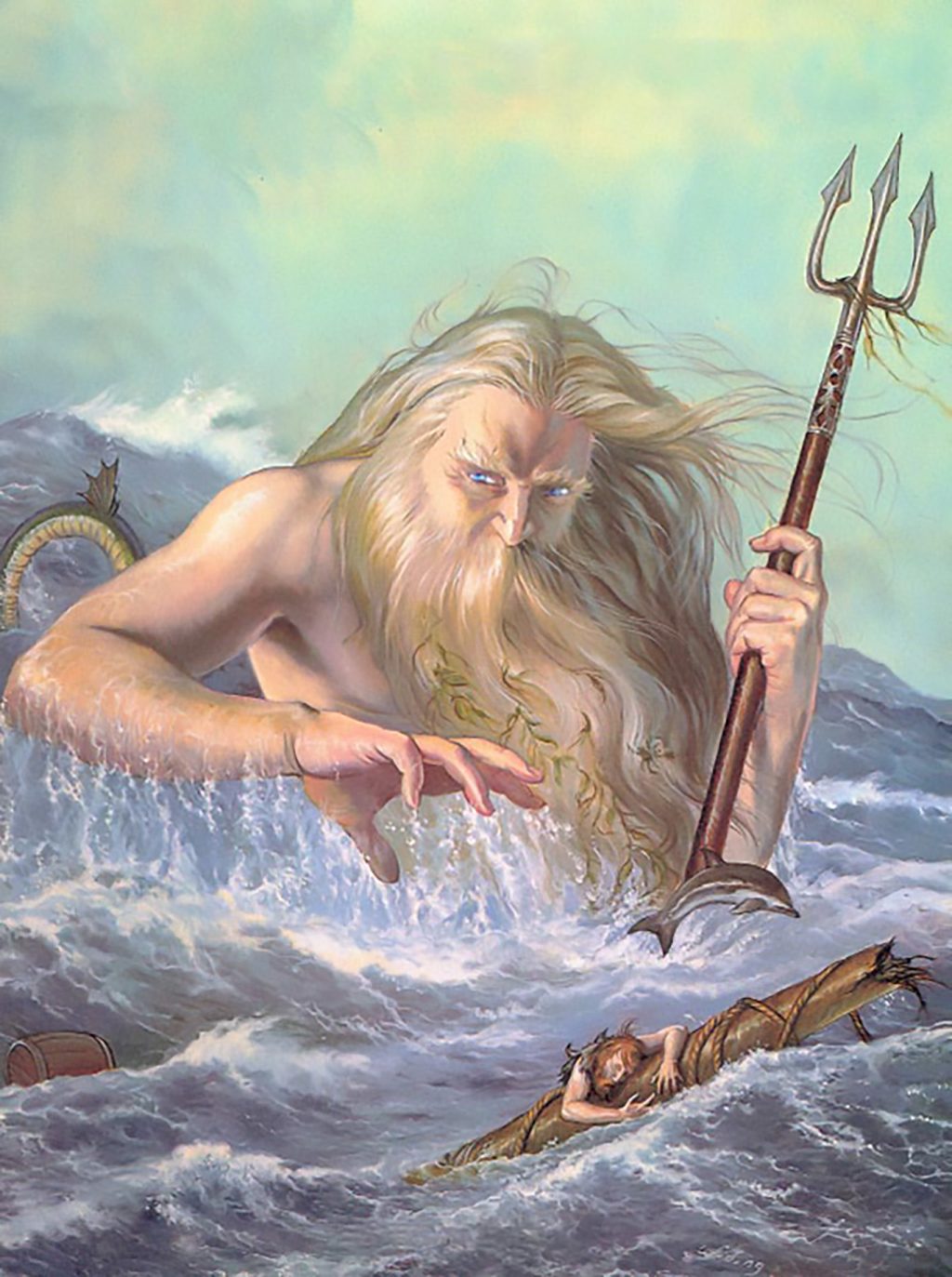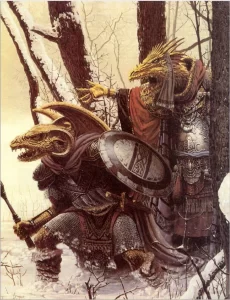
The Motivations of Gods
What do you get for someone who has everything? In a fantasy role-playing campaign that includes powerful immortals, the question isn't as frivolous as it sounds. What do the gods want? By comparison, mortal NPCs are easy to handle. Your normal Tom, Dick, or Bubba is only scrambling after his fair share of life, liberty, and a modicum of happiness. But all those things are part of the package if you're a god. A game master may find himself facing a restless immortal who querulously demands, "What's my motivation in this scene?"
That's what this article is about: the motivations of the gods. Why do they do what they do? Why are they involved in a game devoted mostly to mortals? And what can the game master do to make their actions more realistic, easier to portray, and more fun in his campaign?
The Homeric poems provided a clearer and more rational picture of the nature of the gods and of their ways of manifesting their power in the lives of human beings. The gods were no longer cloudy, indistinct shapes with mysterious and moody purposes. They had become sharply defined figures, conceived in the likenesses of men and women.
We must view the gods of all national pantheons this way if we want to understand and use them as NPCs. We must see the gods as human figures, with human needs and weaknesses. Then we'll discover how to make them realistic, three-dimensional figures in an FRP campaign.
Metaphysical Destinies
Some claim that the gods have no place in an FRP campaign. They point out that even if high-order deities such as the Nordic Odin or Crom did appear in a campaign, they would do so only as observers, not as participants who favored one side or the other. They cite that it is often because the Gods do not give to men what they want when they want it that the impatient amongst us turn to demonic forces to grant their requests.
However, actual mythographers have taken the opposite point of view, and some have even claimed that the fate of the gods is intimately entwined with that of mortals. Gods who do not serve some abiding need in humanity are soon cast aside. The principle of universal law that states that a day without work is a day without food is applicable even to deities.
The Olympian gods are a prime example: Although they retained their nominal stature in historic Greece for a long time, the people strayed to the gods and spirits who served some human need.
If we're discussing what the gods want and what motivates them, this is certainly a prime indicator. If the gods want humans to continue to give them homage, they must be involved with humans. Moreover, they must benefit humans.
A skeptic might argue this is true only of mythological gods, who can be treated somewhat cavalierly by their human creators since we know (or we think we know) that in the real world such gods do not exist. In an FRP campaign, on the other hand, we're playing the roles of our characters and must accept the premises of the character's world-one premise being that the gods are very real. A real god does not depend upon the homage and respect of humans to maintain his authority, let alone his health and well-being. He can afford to be as contemptuous of human feelings as he likes.
Let's assume that our skeptic's argument is true-that a really powerful god may be as independent of humanity as he pleases. Such a god may pursue his own celestial ends, far beyond the scope of human understanding, disdainful of the fact that his worshipers are drifting away. But such a god is unlikely to appear in any pantheons at all, or will perhaps be only a distant echo of memory. Like the wind that you know only when you see the effects of its presence, this god will be as unnoticed by humanity as he is unnoticing. Humanity will pay attention to the gods who are around, the gods who have some effect on their lives.
The relationship between humans and gods was considered to be one of mutual advantage. The gods were thought to need gifts of food and drink, though they had their own special foods (ambrosia and nectar), and could be flattered by the offer of food by humans. In Homer's Iliad and Odyssey, the human heroes frequently remind the gods how faithful they've been in offering sacrifices; the heroes even offer hecatombs (sacrifices of a hundred oxen each, considered to be an excellent gift). In return, the heroes expect the gods' favorable regard.
Even Masters Have Masters
If your campaign will include the gods or more than one pantheon, how will you determine the relationships between them? Both Zeus and Odin make claims about regulating the stars in the heavens and fashioning the dominions of the Earth. The Egyptian god Khepri (Ra) is said to be the original creator, the Father of All-but so is the Babylonian Anu. The Greeks have claimed the same role for Oceanus, Eurynome, and Gaea (Mother Earth). Who is right? Is any one of them right? These are not idle questions for the game master who must decide such disputes in his campaign.
The easiest course for the GM is accepting that the pantheonic gods are neither as all-wise nor as all-powerful as they pretend. The Olympians are not omnipotent or omniscient; each limits the other, or even opposes the other; any one of them, especially Zeus, can be deceived. The Norse gods were magnified mortals, subject to birth, hunger, sleep, sickness, passion, sorrow, death; they excelled men only in size, longevity, and power. Of Odin, it is said he was not unchallenged nor omnipotent; Loki scolded him like a fishwife, and Thor quite ignored him.
Lacking supreme wisdom, Odin went looking for it. He bartered one eye for the privilege of drinking from the Spring of Mirmir, then allowed himself to be sacrificed on the ash tree Yggdrasil, all to gain wisdom and knowledge. But it was not enough. Odin went to the Sybil in order to obtain a prophecy about the climactic battle of his reign-for all the gods know Ragnarok is fated and cannot be escaped. The Sybil answered Odin in detail, but a flying dragon distracted her. Though she had much yet to tell, the Sybil would not go on. Is it that Odin chose not to compel her, or that he could not compel her to finish?
As for Olympian Zeus, he is hoodwinked again and again. Prometheus tricked him in the matter of which portions of a sacrificial bull should be offered to the gods and which should be kept by men for themselves. Prometheus tricked Zeus again when he circumvented Zeus's prohibition against giving fire to mankind. And Hera employed the god Sleep to distract Zeus so she could do mischief to Heracles (Hercules). In the battle before Troy, Zeus would have liked to save his mortal son Sarpedon from death, but he could not contravene the will of the Fates. Zeus would also have saved three other sons: Aeacus, Minos, and Rhadamanthys. But again, Zeus could not defy the Fates. Most telling of all is the story that Prometheus held a secret vital to Zeus's reign-a prophecy about a woman with whom Zeus might mate, whose son would be greater than his father. Zeus, however, was unable to wring the information from Prometheus at any price. These are not acts of omnipotence nor of omniscience.
We know from the myths themselves that Zeus was in awe of the great goddess Night. We also know that Zeus cannot oppose the goddess Necessity; that he is subject to Fate or the Fates; and even that in some cases it is the Fates-not Zeus-who assign duties to each god.
Odin may be called the All Father, but in some of the older tales we hear of the Allfadur, so terrible and so guarded by awe that no stories are told about him. He is never even named, as his name is death to utter. He is Creator and Dispenser, master of the goddesses of Fate. It is he who has decreed Ragnarok and who will build the world anew when all has passed away.
So we do, indeed, have a Master of the Masters, whether we call this master Night or Necessity or Fate or the Allfadur. This master stands over and above all the pantheonic gods. If mortals rule by virtue of the authority invested in them by the gods (as is well established in mythological thought), isn't it reasonable to assume that the divinities rule by virtue of the authority invested in them by Necessity?
What's Mine is Mine
The gods are reasonable beings who act from intelligible motives. But what are their motives?
The motivations of pantheonic kings such as Zeus and Odin are integrally involved with their exercise of power, much as a human king's are. Mortal kings reward faithful followers with grants of weapons, land, and favors. They punish enemies in dire fashion and administer justice within their domains-all the while jealously guarding the boundaries of their kingdoms and the rights of their vassals.
Zeus and Odin do the same. The lesser gods attend their courts exactly as feudal barons would attend the court of a national overlord. Recognition of the god-king's ascendancy is expected and is rewarded by the delegation of power. Zeus made Hermes the guardian of treaties, commerce, and travel, and he made Artemis the protectress of the roads and harbors of 30 chosen cities.
When Apollo's son, Asclepius, the famous physician, raised a man from the dead and thereby infringed upon Hades' realm, it was from Zeus that the God of the Dead sought redress. Zeus, in turn, slew Asclepius. Apollo, Zeus's favorite son, saw this as an infringement upon his rights; he countered by slaying Zeus' armorers, the Cyclopes. Only the intercession of the goddess Leto (Latona), Apollo's mother, saved Apollo from the full force of his father's vengeance. As it was, Apollo was condemned to serve the mortal King Admetus of Therae for one year. Apollo acquitted himself so well in this service that he was taken back into Zeus' good favor. The entire story is reminiscent of something out of the turbulent lives of medieval kings and their unruly sons!
Odin, too, behaves in a similar fashion, dispensing weapons and counsel to loyal followers who thereafter are expected to serve faithfully in both life and afterlife. The similarities between Greek and Nordic myth are no accident. Both Zeus and Odin are the eldest of three brothers and are therefore inheritors of the godly throne. In Book XV of the Iliad, Zeus's brother Poseidon, God of the Sea, would like to dispute the commands of Zeus and assert his right and power to do as he pleases in his own domain-but the reminder of this moral preeminence restrains him.
Zeus and Odin also cared about the size and quality of their personal retinues. Among gods as well as among men, the power and loyalty of a king's entourage has a direct bearing on the power of the king. We know that Odin took particular pains in selecting the fallen in battle, recruiting the best to follow him and the other gods when they faced their doom at Ragnarok. While Zeus may never have been so blatant about his need of mortal followers, he certainly valued the loyalty of minor gods and demigods.
There was a time when Zeus's exercise of authority had become so intolerable to the other Olympians that they plotted against him. Having placed his fearsome weapons out of his reach, they took Zeus while he slept, binding him to his bed with rawhide thongs. They intended to depose him and raise one of their own number in his place, but they wasted time arguing over the division of spoils. It was then that Thetis the Nereid earned the lasting gratitude of Zeus, which she later put to use on the behalf of her son Achilles. Unobserved, she left and sought out Zeus's loyal follower, Briareus of the Hundred Hands. Briareus managed to release his master, who quickly turned the tables upon the conspirators. Without the loyalty of this single mortal, Zeus would have fallen like Uranus and Cronus before him. This lesson on the importance of a king's vassals could not have been lost on the Father of Gods and Men.
All of the gods, in fact, have their own domains and retinues. Each god jealously guards the rights and honors of his own personal sphere of interest. To understand how far that jealously extends, look at the Greek word timé: Honor, particularly the honor due to anyone on account of his station. This can be elaborated to include rights, powers, privileges, and even duties. Everyone has his own timé, including humans. Timé imposes duties and obligations on an individual, and it defines his relationship to others. Because of the insult to his timé, Achilles withdrew from the Achaean forces before Troy in Book I of the Iliad. It was Achilles' timé-his anger over his damaged honor-that prevented him from rejoining the Achaeans until his friend, Patroclus, was killed.
To the gods, who are quick to defend what is theirs, timé is as real as any physical object. Greek gods, like Greek heroes, were moved by considerations of personal honor, and anything which might be construed as an affront to it excited their anger and called for violent vengeance. Forgiveness was not in their nature, and once a man had offended them, he had no excuse and could expect no mercy.
The Iliad provides an excellent example of how quick the gods were to defend their honor. As Book I opens, the Achaeans have abducted Chryseis, the daughter of Chryses (a priest of Apollo). They have given her over to their overlord, King Agamemnon. Chryses comes to the Achaean camp before Troy to ransom his daughter, and he carries the official symbol of his priesthood: the scepter of Apollo, properly garnished to show his intentions. But not only does Agamemnon refuse to let the girl be ransomed, he drives Chryses off with insults. The priest is well aware of his status and of Apollo's timé, so he appeals to his god for redress. Apollo answers by sowing arrows of death among the Achaeans. This drives the assembled Achaean leaders (with Achilles prominent in their forefront) to force Agamemnon to return Chryses' daughter. Agamemnon complies but replaces her by taking the girl Briseis, who had been given to Achilles. This is the offense against Achilles' timé that precipitates the disastrous quarrel that is the theme of the Iliad.
Artemis, Apollo's sister and the goddess of the hunt, was stirred to rage by an unintentioned slight-and thus brought about one of the greatest adventures in Greek mythology. Artemis's timé entitled her to yearly sacrifices from such kings as Oeneus of Calydon. Oeneus neglected to make the proper sacrifice to Artemis one year, and the goddess was furious. She had been robbed of a part of her timé, which is as great a loss as if she had been robbed of her bow or quiver. In retaliation, she dispatched the monstrous Calydonian Boar to ravage Oeneus's lands. Helpless in the face of this menace, the king called for aid, and the finest heroes of the age assembled for the great hunt.
Gods Need Love, Too
There are few gods (at least in the Greek pantheon) who haven't had romantic liaisons, though some do without formal marriage. Three Olympian gods in particular are renowned for their romantic exploits: Zeus, Poseidon, and Apollo. The trysts of Poseidon and Apollo outnumbered those of most other gods-yet compared to Zeus, these two were monks.
Even a partial list of Zeus's conquests becomes tedious. They include: Metic, mother of Athena; Themis, who bore Zeus the Horae and the Fates; Eurynome, mother of the Graces; Demeter, mother of Persephone (Core); Mnemosyne, who bore Zeus the nine Muses; Leto, the mother of Apollo and Artemis; Dione, who some say was the mother of Aphrodite; Maia, mother of Hermes; Semele, mother of Dionysus; Tymbria, mother of Pan; and, of course, Hera, Zeus's official wife and the queen of the gods. Hera bore the deities Ares, Hephaestus, and Hebe, and perhaps bore several other goddesses as well-though it's often said that she conceived and bore Hephaestus by herself, just to prove she could do without Zeus.
Zeus fathered many human children. By Danae he had the great adventurer, Perseus. By Europa he fathered Minos, Sarpedon, and Rhadamanthus. The most famous of his human children was Heracles, son of Alcmene, whom Hera so devotedly hated. (And by her hatred, she made him great-an interesting object lesson.)
Love is clearly as important to the Greek gods as it is to humans. Like humans, the gods do not escape the entanglements to which romance can lead, nor do they miss the intrigues, conspiracies, or delights. The Greek gods are motivated by their gender as anyone you can imagine. If this appears to be less true in other pantheons, perhaps it's more because of our lack of information than because of the gods' lack of activity. The Persian goddess Anaita (Anahita) is known as "the Persian Aphrodite," probably for very good reasons.
The Norse god Freyr (Frey), God of Plenty, is known to have loved the beautiful giantess Gerda. He even bartered his Sword of Victory to his servant Skirnir, so that Skirnir would act as a go-between for him. Freyja, sister of Freyr, is the Goddess of Love in the Nordic pantheon. Her enemies told many scurrilous tales about her romantic adventures, some of which may have been true. The only reasonably documented account, however, is the story that she slept with four dwarvish artisans to encourage them to forge the Brisingamen necklace for her. Many giants lusted for Freyja, but she favored none of them.
Odin himself was not immune to the lures of love. Though Frigga, goddess of nature, love, and the home, was Odin's wife, she was not the mother of Odin's son Thor. Instead, Jörd, goddess of Earth, or Fjorgyn, a mountain giantess, bore Thor to Odin. Girdh, another giantess, gave Odin his son Vithar.
However, it's among the Greek gods that the most frequent and interesting love tales are told. For example, Eos (Dawn) suffered a desire for young mortals that was no fault of her own (well, perhaps it was indirectly her fault, for she slept with Ares, and the jealous Aphrodite cursed her with this longing). Among her loves was Tithonus, son of Tros, whom Eos so loved that she begged Zeus for the gift of immortality for him. But she neglected to ask for perpetual youth as well-a serious error. When Tithonus eventually grew old and withered, Eos tired of him. He was, mercifully, turned into a cicada. Immortals may love, but their love is hardly immortal.
Gods Errant
In many mythologies, the gods emerge from their remote and forbidding homes to travel the Earth to mingle with mortals. Among the Greeks, such mingling gives rise to the many love affairs of the gods. The fruits of those affairs lead to further entanglements with mortals, for the gods often have a lively interest in their children and bend their powers to advance their children's fortunes. The gods, too, have their favorites among mortals. They frequently observe, counsel, and aid those who-by valor, faithfulness, or other virtues-capture immortal attention.
A famous example of this occurs in Book I of the Iliad. Agamemnon and Achilles were favorites of the goddesses Hera and Athena. When Achilles threatened to turn his sword against Agamemnon, Athena stayed his hand. Grudgingly, Achilles took her instruction to bide his time, for those who listen to the gods are listened to by the gods. He withdrew from the council of the kings. But since his honor had been injured, he beseeched his mother, Thetis the Nereid, to persuade Zeus to punish the Achaeans for this affront. Zeus did so-and thereby hangs the entire tale.
Later, Achilles' close companion, Patroclus, was slain by the Trojan Prince Hector. Patroclus was wearing Achilles' armor, which is now taken by Hector. Achilles repented his withdrawal from the war and made peace with Agamemnon, agreeing to reenter the fray. But now he had no armor. So his mother, Thetis, intervened on his behalf once more and persuaded Hephaestus, armorer of the gods, to create new armor for her son.
We've already seen how Demeter wandered among men for 10 days in disguise, in search of her abducted daughter, Persephone. Artemis, goddess of hunting and the chase, must have often passed among men. Her brother, Apollo, was one of the three Olympian gods most inclined to act on behalf of humanity (the other two being Hermes and Prometheus). In his capacity as god of the flocks and cattle, Apollo was often seen with herdsmen. As a god of prophesy and a master of music, he was much sought by seers and poets, who did not find him aloof.
Athena taught the arts of civilization to mankind and frequently circulated among mortals to distribute the benefits of her wisdom. From time to time, she employed Perseus, Bellerophon, Heracles, and other heroes for the furtherance of her aims and for the protection of Athens. She taught the making of 50-oared ships to Danaus on the island of Rhodes in the Aegean. She also directed the famed shipbuilder Argos in the making of the Argo, the ship on which Jason and his Argonauts sailed in search of the Golden Fleece. Any valiant mortal dedicated to the service of wisdom and civilization can expect a good hearing from Athena.
Hermes-messenger of the gods and himself the god of roads and thieves-was a much-traveled deity. Shepherds were favorites of his, and he had numerous children by nymphs and shepherdesses. But Dionysus (Bacchus) was the most notorious wanderer of all the gods, and many myths are told of his journeys. Born in Thebes, he visited faraway India, Syria, and Egypt. King Midas, of the Golden Touch, was his close friend.
Even the greatest of the gods, the pantheonic kings, were not above journeying on Earth. Odin wandered over the earth seeking wisdom. It's said that Odin loved to travel among humans incognito, to discover how they acted and what they thought. Thor, too, enjoyed such journeys; during one such trip with Loki, Thor had his famous adventure with Utgard-Loki, the giant king.
Like Odin, Zeus frequently walked in disguise among men to discover how they treated one another-and how they might treat him, not knowing his true identity. Zeus was the god of hospitality and the protector of the rights of guests and hosts. It was particularly important to him, for the protection of his timé to know the kind of welcome that might be accorded to wandering strangers. Zeus and Hermes once traveled together and were entertained by the poor couple Philemon and Baucis. These two were richly rewarded for their kindness toward unknown travelers, while their neighbors were killed for their ungraciousness.
Conclusion
We began by asking a question: What motivates a god? In pursuit of that question, we've discovered that the gods are neither so aloof as we might imagine, nor so supremely powerful as we've been led to believe. They have their weaknesses and their needs, and in compensating for the first and catering to the second, they can and do act in a very human fashion. They have their loves and their hates, and they're excruciatingly sensitive to the dictates of their honor. They have a hunger for homage-a hunger born of convenience, habit, and comfort, perhaps, but a very real hunger nonetheless.
Most of all, masters though they are, the gods have their own master. A higher power holds them accountable for their actions, a fact they are not likely to forget-but it's a foolish human who would impudently remind them of it.
Humans themselves are fascinating creatures to the gods. The immortals find human beauty very appealing, and the Greek world, at least, abounds with the offspring of gods and humankind. The gods are willing to put up with a great deal from humans. In the polite fictions of social contact, a High King may easily be considered the moral equal of a lesser god, in a nearly static social pyramid that reaches from the lowest slave up to Zeus, Odin, Enlil, and beyond. Certain impassable barriers divide the different levels of the pyramid-and woe to the mortal who pretends to be a god, or to the serf who dares to rebuke a king! But the mutual obligations involved in the relationships are strong and enduring. The feudal analogy is a good one: A wise king does not go out of his way to alienate his vassals, and neither do the gods abuse those who give them due homage.
In every situation, the gods are governed by private interests as well as public ones, just as men are. Zeus favors Heracles, for personal reasons; Hera opposes Heracles, for personal reasons. Athena aids and protects Perseus because his actions further her plans. In Book I of the Iliad, Achilles explains the bond between men and gods when he says that he will obey Athena because "the gods will hear the man who hears them."
All of this provides a good rule of thumb that we can use to understand the gods of any mythological pantheon. Now, when an impatient immortal demands, "What's my motivation in this scene?" we will not go far wrong if we reply, "The same as a superior human's would be."





